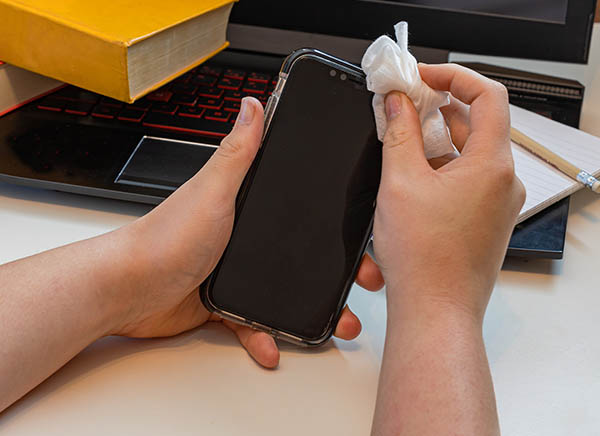
A study carried out by the Mohammed Bin Rashid University of Medicine and Health Sciences (MBRU), in collaboration with Dubai Police and Australia’s Bond University in Queensland, has highlighted the need for mobile phone and smartwatch sanitization to be included in global infection control protocols for the betterment of public health.
The pandemic demonstrated the value of infection prevention strategies like handwashing and social segregation in enhancing public health. New research, however, shows that if wearable technology is not cleaned, hand hygiene habits are rendered ineffective. Since warm temperatures and highly touch-sensitive surfaces are perfect circumstances for germ growth, smart devices like smartphones and smartwatches are a potential breeding ground for disease-causing microorganisms. For maximum bacterial eradication, researchers advise routinely wiping down your smartphone with an alcohol wipe.

Professor Abiola Senok, Chair of Basic Medical Sciences and Professor of Microbiology and Infectious Diseases at MBRU’s College of Medicine said “Our phones are never far from our sides; we take them everywhere with us. We all need to have a habit of regularly cleaning our mobile phones and smartwatches as much as we do our own hands.”
The researchers from MBRU and Dubai Police in this study, examined in an emergency Medical Unit the extent of microbial contamination on smart devices. next-generation metagenomics sequencing technology was used to check samples from phones and smartwatches, along with samples of the hands of healthcare workers to help researchers to identify which organisms are contaminating these devices.

Lieutenant Colonel Dr Rashed Alghafri, Director of the International Center for Forensic Sciences in the General Department of Forensic Evidence and Criminology at Dubai Police said “Our research findings showed that organisms identified from the hands of healthcare workers were also detected on their mobile phones and smartwatches.”
Multidrug-resistant pathogenic bacteria were among the microorganisms found on the wearable technology of healthcare personnel. One of the randomly chosen mobile phones tested for SARS-CoV-2 had a positive result from the COVID-19 zone of the unit.
Alghafri added “The presence of these microbes poses a risk of pathogen transfer to patients and the community. Infection control protocols, like mobile phone sanitation, could reduce this risk.”
Dr Lotti Tajouri, Associate Professor at Bond University in the field of Molecular Genetics and a member of the Dubai Police Scientific Council said “Our findings are also important for global public health as organisms on the surface of mobile phones and smart watches can be carried across international borders by travellers.”
He also believes that sanitation protocols like ultraviolet C sanitization devices in public spaces and airports should be investigated to mitigate the risk of microbial contamination and dissemination on smart devices.
